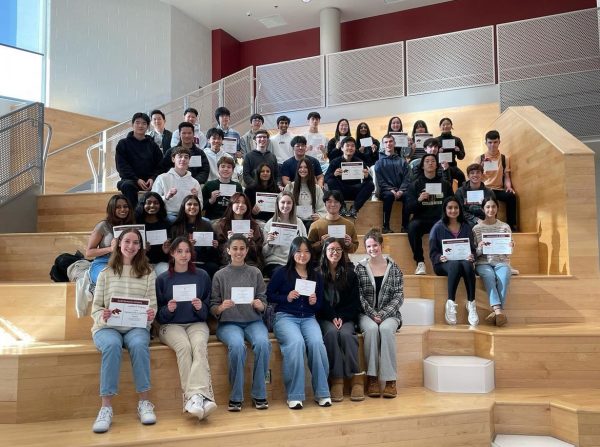Trials and Transitions
Exploring the adjustments at each grade level
The beginning of a new school year is always an exciting time. Students gather new supplies, new outfits, and take on a new attitude towards a new grade level. When we are younger, each grade may bring a few new aspects, however, during high school each of the four years serve as major stepping stones in shaping the type of students and people we become. At every grade level, there are a new set of expectations, all of which require a great deal of adjustments that we, as students, must learn to make in order to be successful in the coming year.
Starting off, freshman year is quite a jump from eighth grade. Freshmen not only have to adjust to new normalities in their coursework; they are adjusting to an entire new school. Oakton is much bigger than most middle schools, and its layout is a bit confusing. Getting lost is inevitable. In a more figurative meaning, it is also possible for students to get lost in the shuffle. Transitioning from a school with only two grades to four is very different and can cause a lot of stress. However, current freshman Emily Steindl thinks differently. “Middle school was stressful both academically and trying to fit in socially. In high school, we have a lot more freedom and people are more mature and less judgmental,” said Steindl.
Steindl has been enjoying the beginning of her high school career. She’s a member of Oakton Dance Team, which has helped ease her transition further. Because she got to practice with the team over the summer, school was made easier as she already knew a handful of girls and was comforted by their familiar faces. She said, “I felt more confident coming into high school with teammates and friends I already knew.” Steindl enjoys dancing with her team each Friday night at the football games.
From an academic standpoint, expectations for freshmen are much higher than those in middle school. The workload, no doubt, is heavier. Steindl was surprised at the idea of homework on the first day. She was told by her older brother and older friends that “freshman year is easy,” but it is important that we recognize freshman year is still a monumental adjustment. Overall, Steindl feels that “high school is most definitely more fun, but is also is a lot more demanding.”
Many argue that sophomore year is a continuation of freshman year, and the demands don’t increase. This may be true for some, but isn’t always the case. For many, sophomore year is when students take their first AP courses, most commonly AP World History and/or AP Statistics, AP Art History, or AP Computer Science. This is a time when many students feel that this is when they truly learn how to study, as AP courses are much more rigorous than honors or general education ones.
Growth occurs in a social aspect during sophomore year as well. This is a time in which people break further past their middle school and freshman year shells and begin to feel most themselves. Sophomore George Briggs reflected to the Outlook about his growth socially and in his personality. “At the beginning of my freshman year, I cared a lot about what others thought of me. I felt an extreme need to fit in and for others to like me. However, as I got older, I realized that those who judge you aren’t people you should have as friends. I slowly began caring less and less and started doing more things for myself rather than others. I started valuing my friends who liked me for me more, and I am happier having those people in my life. Now, I can say I am ten times happier than I was a year ago, and have never felt more like myself,” said Briggs. It is important to remember change occurs at each phase of high school, not just in the classroom, but for students as people as well.
Junior year is arguably just as much of a transition as freshman year. This is a time in which high school students begin exploring their post-high school plans, many of which involve college. Schedules become a whirlwind of APs and extracurriculars, are chosen in order to “look good” and “be what colleges want.” Junior Anna Goodin noticed these differences right way. When taking more rigorous classes, there’s not a lot of time for a “syllabus week” and adjustment to classes. Once a junior, you hit the ground running with your classes, and workload is high from the get-go.
Goodin also notes the intensity of activities outside of school, such as becoming older and have more responsibilities in the organizations you’re a part of. This year, Goodin is one of the leaders of the Oakton Improvables, a type of drama club at Oakton. “Although being a part of this group and being a leader is exciting, it takes up much more of my time out of school than it had when I was an underclassman,” said Goodin. Extracurriculars have been a major and important part of Goodin’s high school experience, and she believes it has helped shape her into the high school student she is today. Her advice to underclassmen is as follows: “Give it all a try. Get involved. Try out for new things and see what you like. Getting involved in these things is the best way for you to find your niche and find people to become close with in high school.”
Finally, we approach senior year. Full of millions of emotions, it is a rollercoaster ride to say the least, but it is also arguably the most exciting. For starters, there are few required classes seniors must take, so students have a wide range of opportunity to choose their courses. “This is the first year every single one of my classes is in a field I’m interested in. I don’t feel forced into taking classes for graduation requirements. This is the first year I can see my classes taking me to somewhere into a professional field I’m interested in for after high school,” says senior Ben Wagner. There is a consequence that comes with this, however. Most of these classes of specialized interest are only available at the AP level. This results in a lot of seniors taking a high number of AP courses, which regardless are worth the work because these students are excited about and interested in what they are learning.
Of course, there is also the slew of college applications that come with senior year. Much like the APs, applications are both exciting and stressful. “It’s exciting for me to know that in three months I’ll know where I’m going, and after my 12 years in the public education system, I’m finally approaching an end goal,” Wagner said. Combining apps with school and a social life can be challenging, however the ends defy the means.
It is clear to see that every step of high school is a crucial one in shaping our lives as students and people, not just during our time at Oakton, but also after we leave. Our years in high school help define our identity, academic, and extracurricular interests, making a lasting impact on us as individuals. It is crucial to anticipate being aware of these changes at every step so we know what is to come throughout our time at Oakton.





